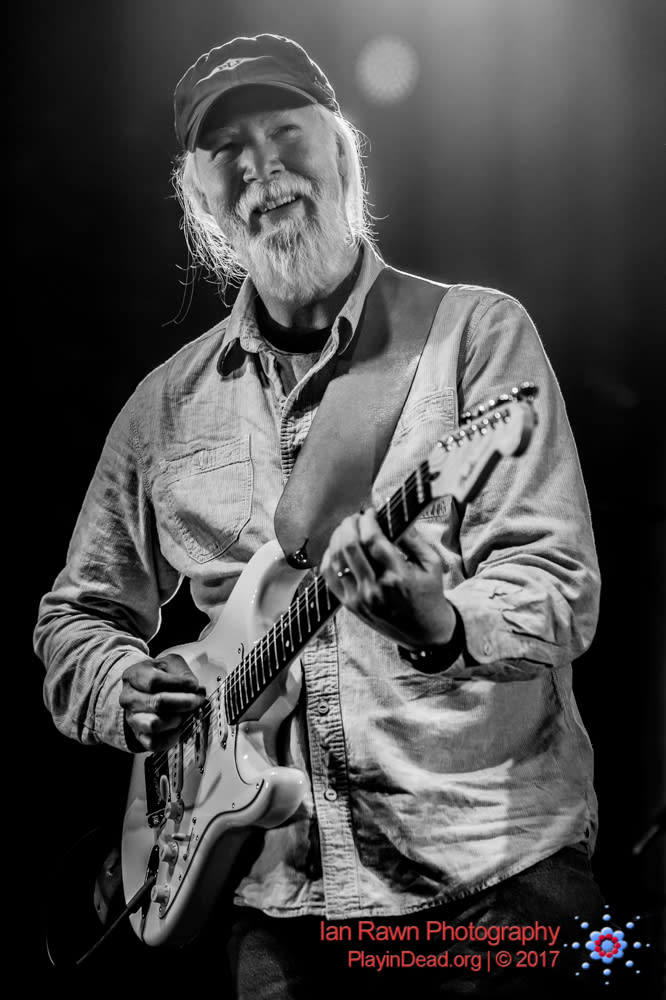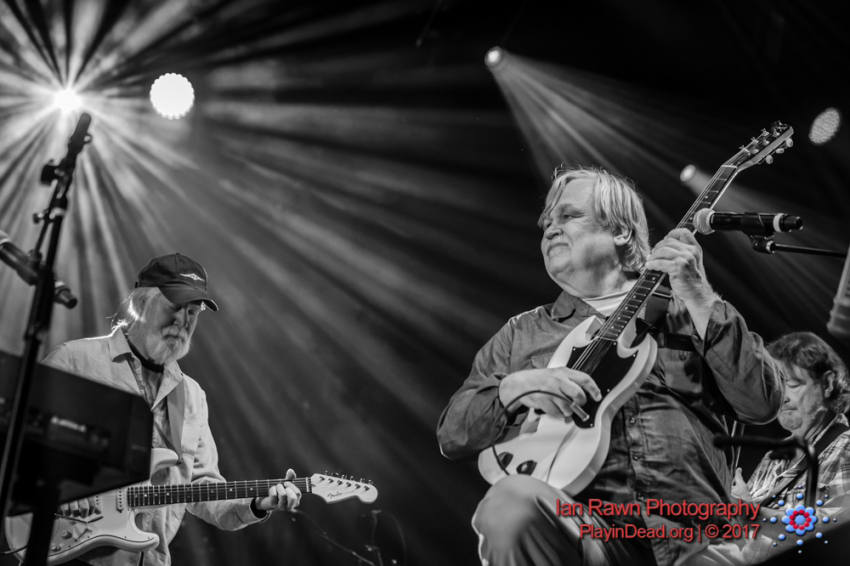Cracking The Invisible Whip: Jimmy Herring Discusses New Band, Widespread Panic & More
By Chad Berndtson Oct 20, 2017 • 7:02 am PDT
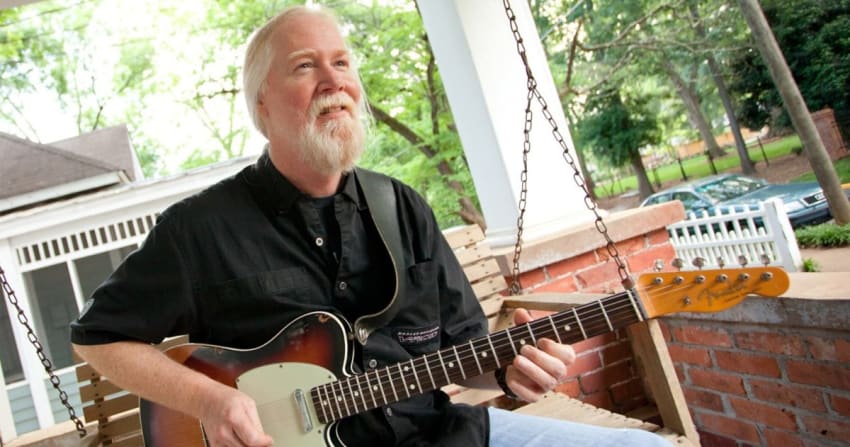
Welcome to another edition of The Art Of The Sit-In, where we mix it up with the scene’s most adventurous players and hear some stories from the road. For more, check out our recent interviews with Andy Falco, Bruce Hornsby, Nels Cline, Eric Krasno, Todd Nance, John Popper, Andrew “Red” Johnson and many more. (A full archive of more than 50 The Art Of The Sit-In features is here.)
A lighter touring schedule for jam band legends Widespread Panic has given its members opportunities to do other things, and in 2017, Jimmy Herring has taken full advantage of that time with the debut of his new band, The Invisible Whip. It’s what you might call a band in Herring’s wheelhouse — a classic jazz fusion combo with no shortage of quirk, lots of room for Herring’s dazzling improvisational guitar chops, but also a collective — evolved from, though not unlike, the Jimmy Herring Band from around 2009 and 2010.
Some of the same players are back, too. The Invisible Whip is Herring and a hand of aces, including drummer and longtime compadre Jeff Sipe, keyboardist Matt Slocum, multi-instrumentalist Jason Crosby, and bassist Kevin Scott. The band’s been playing out often in between Panic runs this summer and into the fall, but in October they embark on an ambitious co-tour with one of Herring’s heroes: the great John McLaughlin and his 4th Dimension band. What’s promised is the stuff of guitar-driven jazz fusion dreams: a set by The Invisible Whip, a set by the 4th Dimension, and then a combined set focused on classic Mahavishnu Orchestra material.
Here’s Jimmy on getting deep with The Invisible Whip, the state of Widespread Panic, and other ways he’ll seek to “fill the holes.”
JIMMY HERRING: How are you?
JAMBASE: Doing great. Hard to believe it’s already October.
JH: I know, I know. I was in New York in November last year, and that’s when I was talking with John [McLaughlin] about doing this while he was playing with Chick Corea at the Blue Note. I’ve had a good amount of time to think about how to do this.
JAMBASE: We’re definitely anticipating your tour with John but I have to say, Jimmy, The Invisible Whip shows that have happened so far have been so much fun. Has this met your expectations?
JH: Well thank-you so much. The one disappointment I have is that we just don’t have enough music — don’t have enough time to put together more music. You know, coming through all my years now with jam bands, those bands have such an awesome way of doing things. It’s a different set of muscles they flex than what the guys in the jazz fusion world flex. That’s a different thing completely. But someday I’d love to take some of the ideas I’ve seen in that world and bring them to this world. They have hundreds of songs — it’s just so awesome and you never play the same show twice. But I love these guys I’ve been playing with in The Invisible Whip and have loved them for a long time. All the expectations are met. Honestly, I never think about it that much.
JAMBASE: Has the chemistry been what you thought it would be? You’ve talked a lot about what went into putting together this lineup including the two keyboardists.
JH: Yeah, absolutely. The chemistry is all you could ask for as a musician. My whole thing about two keyboard players — and that’s been a thing of mine for a long time, I just could never do it — was just to do it. We can’t really afford to do it, but the music matters more than anything. Everybody makes less, but that’s OK, and both those guys were like yes, let’s do it. I really like it because you can orchestrate things a bit more. It sounds like a lot of the music I grew up listening to as a fan — I would hear piano and organ on the same track at the same time. I wanted to be able to have that live, and we have an organ and a Rhodes. Down the line it’d be nice to get some synths in there, too, and we will.
JAMBASE: Is there a song in the current repertoire you think just nails what The Invisible Whip is supposed to sound like? Something you guys just crush on a regular basis?
JH: That’s a hard one, man. We’re trying to be kind of diverse, and I have fun playing all the tunes. I like the diversity of going from a ballad to a hard hitting tune. We love playing “Les Brers [In A Minor].” That’s a ton of fun, and that’s for Butch. Butch Trucks loved that tune, and I used to talk about that tune with him a lot and he knew how much I loved that tune. As someone who grew up listening to Allman Brothers music, the timing of that tune, right after Duane passed away, it was a special tune at a special time in their lives. So that would be one.
“Matt’s Funk,” which we play near the beginning of the set, is always fun. And “Scapegoat [Blues]” has morphed from this thing that was so serious into something more fun — something that was more of a blues section in the middle becomes kind of a moving, swing kind of thing that breaks down into half time and makes us laugh.
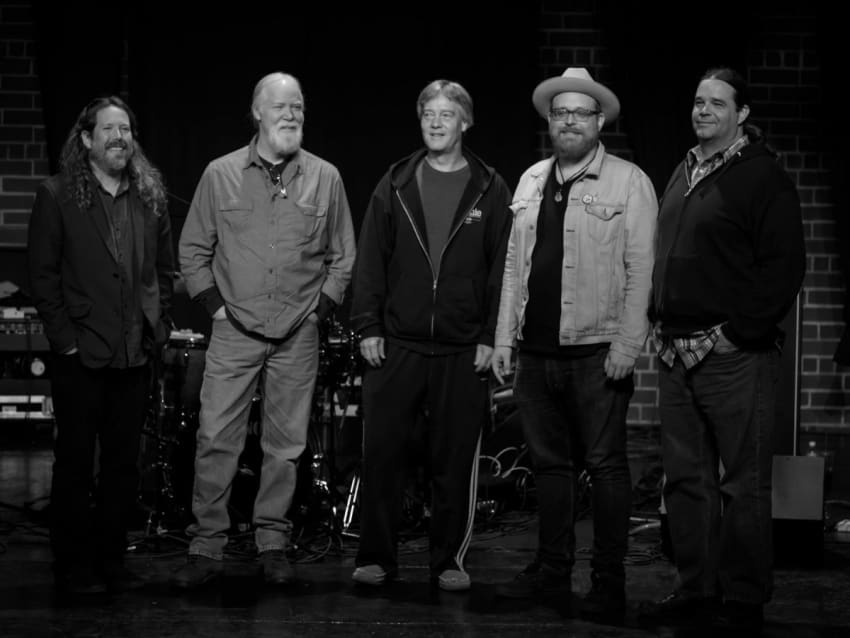
JAMBASE: Is it accurate to describe Invisible Whip as kind of an evolution of what you were going for with the earlier, fusion-y Jimmy Herring Bands? You draw from that repertoire and have some of the same players.
JH: I’d say it’s similar, only now we can orchestrate things a bit more and pull out a tune like “Jungle Book” that we really couldn’t do before. That was a tune we always wanted to do before and it just didn’t come off well because it wasn’t orchestrated enough. So I’m glad to be able to do that — it’s a haunting, beautiful melody in a minor-sixth tonality, and when you have the Rhodes and organ together you can really orchestrate it more.
But down the road, I’ve love to add more music. We didn’t have a lot of time to rehearse … well, we did, but it was sporadic. It would be two days of rehearsal, and then we wouldn’t see each other for like three months, and then we could do another two days. And then we’d go on tour with two days to rehearse just before the tour. We have new songs that haven’t been recorded yet, and maybe they’re not really songs, they’re sketches. We go out and try them out and see what they will be on a given night. And yeah, the last band had some open stuff, but this band, we go out playing music that hasn’t been recorded yet and doesn’t have concrete melodies, just to see what happens.
JAMBASE: I have to assume Invisible Whip won’t end with this tour?
JH: Well, thank-you. But one thing I know is that after this tour I’m going to take a break. It’s just been crazy. It’s not like I’m going to take a year, but at the end of this tour, I’m going to take time and assess what we need with those sketches. The guys have so many good ideas and there are melodies flying around and we really want to write other music to complete this — to have enough to do a record. But who knows what’s going to happen. We all want to play together, but none of us really know what will happen. I do know I’m going to be really tired. You say you’re going to slow down, and then I look at John, and he’s 75 and going out for six weeks and it’s not exactly an easy six weeks or a small gathering of gigs. That’s inspirational to me.
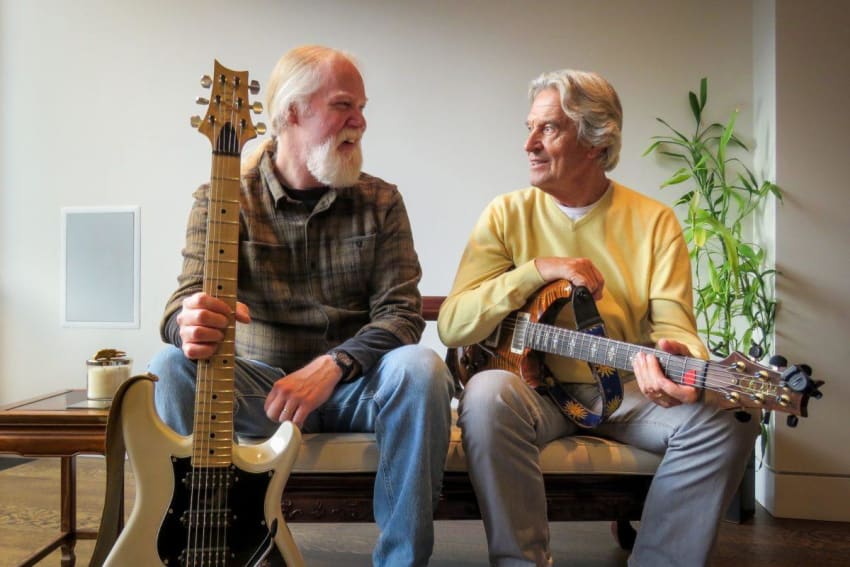
Photo by Ina McLaughlin
JAMBASE: I take it it’s been easier to schedule these things now with Widespread Panic on the road less than in previous years?
JH: Yeah, but I’ve been filling every hole with something, and most of it is this group. This is what Warren [Haynes] does all the time, so I don’t want to complain [laughs], but he’s used to this. I tend to do one thing at a time — I’m really not a good multitask person. But yeah, it’s been easier because Panic’s been playing less.
We’ve been enjoying everything we’ve been doing. The St. Augustine shows, we were wondering if they would even happen with the hurricane, and then we got there and we were thinking, is this disrespectful for us to be playing our little rock ’n’ roll show at a time when this place is hurting? But people kept telling us, no, no, this is helping. All of the people that work there were extremely sweet to us.
We have been playing less, and it’s been really good and fun and I want to keep it like that, though I’d like to see us playing more. We have a blast doing it, though, and it is allowing me time to do this other thing. It’s such different worlds, the Panic thing and this other thing — The Invisible Whip is such a different headspace. Sometimes I will show up to a Panic gig and be like, whoa, I gotta slow down and get back in here. The same thing happens with Panic, and then we’re on the road with this other band and it takes me a minute to settle down.
JAMBASE: You mentioned you would like Panic to be playing more.
JH: Well, sure. I mean sure — definitely not less. I’m just saying, you know man, that this band has been together for over 30 years and what they’ve done is incredible, and I’ve only been here for 11 of them. I will do anything they want to do. If they want to play a lot, I’ll play a lot. If they want to play a little, that’s cool too. I think all of them want to plant things in the garden and see the results rather than miss the results. That’s a metaphor, but people want to be home and spend more time with their families.
JAMBASE: Has your approach to Panic music evolved over time? It still feels in some ways like you just started, and it’s been over a decade.
JH: That’s a really good question. I’d like to think it has. When I first came in, it was tightrope — you walk a tightrope when you step into someone else’s band and someone else’s space. Mikey [Houser] was so unique and had such a sound, and that whole style and sound was a huge part of the group. So for a while I walked that tightrope of how much do I listen to Mike and try to play like him, and how much do I not do that.
I like to think I’ve found a balance. I play too much sometimes, and sometimes it works OK, and other times it doesn’t. I’ll mentally kick myself in the head when it doesn’t: “Oh man, that didn’t fit.” Anybody who joins someone else’s band is going to feel that way if they’re sensitive to it, and I think about it a lot. I go back and listen to Mike a lot, honestly, and every now and then I will hear something I haven’t heard.
So I can’t say how it’s evolved, maybe that’s a better question to ask other people. But it’s on my mind all the time. Especially when we write new music, they don’t want me to not be myself, the Panic guys are always saying, “Man, don’t get hung up on thinking you’ve got to play a certain way — play the way that you play.” And that’s a really wonderful thing. But it is always on my mind, and I’m sure there are diehard old Panic fans who are like, “Man, when is this guy going to slow down?” [laughs] But I’ve learned their language. Any band that had already cultivated something before you got there, it takes a while to learn their language.
JAMBASE: And Widespread Panic is working on new songs?
JH: Yeah, oh yeah. They never stop. They’re always thinking about it, and there’s going to be a get together outside of playing gigs where we’re going to talk about and come up with new stuff. Every time I sit down and play a riff or think, this could be a Panic song, I try to capture it. J.B. is awesome at that. You can send him a riff, or he’ll hear you play something at a soundcheck, and he’ll say, “Hey man, can we record that?” He has this rolodex of riffs he keeps recorded so he can have them to think about. They record every soundcheck and we get a lot of things done at soundcheck. These things we’re getting ready to do at the Milwaukee shows came from a lot of that.
JAMBASE: Any hints on that or Halloween?
JH: No, I don’t have any information. None whatsoever except there’s going to be some interesting stuff. You know how they are — they’re going to try to come up with something they haven’t done for a while, or have never done, and then go into the Halloween shows. I’ll email them and be like, “Do you know what we’re doing, and can you please tell me?” [laughs] That’s just the way it works out sometimes. Sometimes we don’t know what we’re going to do until everyone is together again.
JAMBASE: You’ve talked about your main bands and I’m always curious about other things you’ve been attached to, and other associations you’ve had, and whether you’d go back to any of them. Phil & Friends comes up a lot, as does obviously Aquarium Rescue Unit, but I’m also thinking of things like that tour you did with The Codetalkers before you joined Panic.
JH: Absolutely, man. I had such fun playing with Bruce [Hampton] in any context. The Codetalkers were a great band. Bobby Lee Rodgers had so many good songs. I remember I was invited by Bruce, he called me up and asked what I was doing some weekend and said why don’t you come and play? That was Ted [Pecchio] and Tyler [Greenwell] and Bobby Lee and Bruce — that was an amazing time. I loved that band. It was always fun and it can never happen again.
I still have trouble just coming to grips with the fact that I can’t reach out and call Bruce. I used to call him all the time, at any time. He’d pick up the phone and go “Gawd! What is it that you do out there in Buford, Georgia?” He’d give me a hard time. We miss him. He left us so much. We’re just going to try to continue to play and to work on the things he taught us.
But there are a lot of things. I loved playing with Billy Cobham, Alphonso [Johnson] and T. Lavitz when we did that — I loved that. I love playing with Oteil [Burbridge] or Derek [Trucks] in any way shape or form. Any time something comes along with any of those people involved — I have this close circle of friends that always stays tight. Maybe we don’t see each other or don’t play together for a long time, but when we do, it comes right back.
Other things … hmm. I love vocal music. Instrumental music is fun, and it’s challenging because you don’t have a singer. In vocal music, you support the vocalist, and maybe there’s room for an instrumental section. But another thing I like is having a second person to play melodies with. Jason [Crosby] plays violin, and down the road, I’d love to cultivate that — the two of us playing melodies together. Mahavishnu did that, and the Dixie Dregs, and Jean Luc Ponty did too, and those three represent three of my favorite fusion periods ever, so I gotta be careful not to just copy it. I could do another vocal band, though. There are a lot of people I’ve heard along the way that have impressed me. Lamar Williams Jr. — he’s one, and he’s great.
JAMBASE: Would you ever sing? Give it a try?
JH: No! [laughs] Believe me, you don’t want to hear that. I tried to when I was real young, and it was a disaster — I learned pretty quick that that’s not my forte. But I love great singers and I know what great singing is.
JAMBASE: I’d love to hear recent a sit-in story, Jimmy — you with someone else’s band or someone else with one of your bands. What comes to mind?
JH: Ranjit Barot, he’s John McLaughlin’s drummer, sat-in with us in Macon and then again in Asheville. He just happened to be in town, and that was electric. And Oz Noy. Do you know Oz?
JAMBASE: I do.
JH: That guy is incredible. He and his band members sat-in with us: Darren Stanley and Rai Thistlethwayte [together, Ozone Squeeze]. One of them is from right in Atlanta — Darren, he’s one of our boys and he played in Bruce’s last band. So we had him and Rai sit-in and also Oz too. Rai, he’s really good man. He is a bad dude. To hear what a big sound they can get for just three people is really impressive. He plays bass and keyboard at the same time, and he sings, and sings great. So that comes to mind. That’s most recent one I can think of and it was amazing.
Loading tour dates
